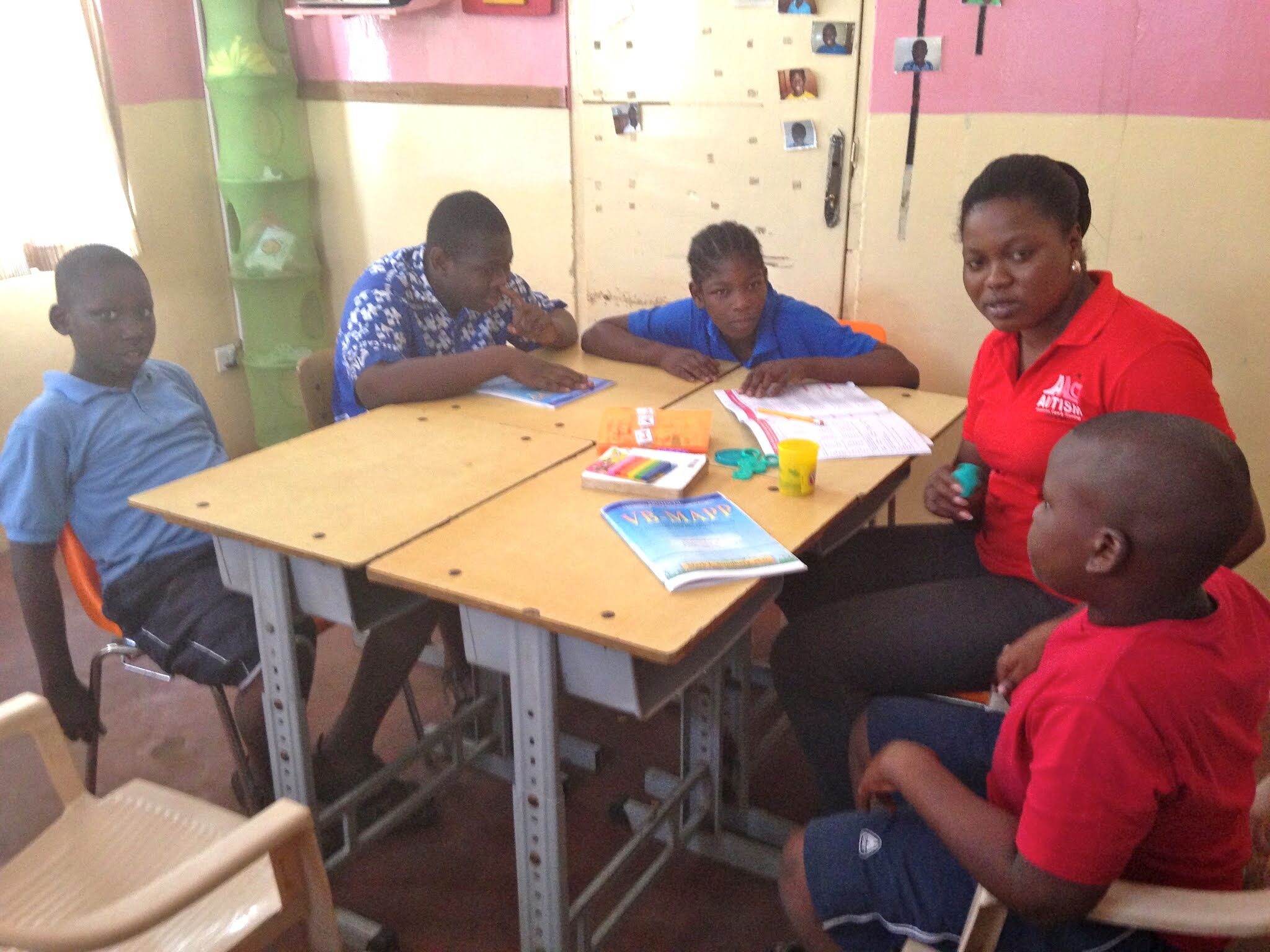The Autism Awareness, Care, and Training (AACT) school in Accra, Ghana reminds me of my own autistic son’s school here in California. Both are places of peace, calm, and competence—plus the occasional whoop, shout, or “eeeee”—while students and staff radiate not just positivity but confidence. This is because students are encouraged to learn to the best of their abilities, and are appreciated for exactly who they are. AACT is a remarkable place.
 |
| [image: AACT staff and students seated around a table.] |
It is refreshing to find an autism school anywhere in the world that focuses on helping its students gain skills and work towards greater confidence in themselves, instead of trying to make autistic kids into non-autistic kids—destroying square pegs by pounding them into round holes (to paraphrase writer and autism parent, Paul Collins). It was a delight to visit AACT, meet and interact with the students, and talk with the staff about the work they do, and why the school is unique in the region.
 |
| [image: Serwah Quaynor and Shannon Rosa onsite at AACT.] |
AACT was founded when Mrs. Serwah Quaynor returned to Ghana after many years abroad, and was unable to find an educational placement that worked for her (then) teenaged autistic son, Nortey. Instead of allowing her frustration to get the best of her, she tapped into autism education philosophies she had learned about when she lived in the United States, and drew on them to create AACT.
Mrs. Quaynor is not only an educator and an innovator; she is a force for social change. Autism in Ghana, as in many parts of the world, is frequently underdiagnosed, misunderstood, and stigmatized. In Sub-Saharan Africa, according to Virginia Hughes at the Simons Foundation Autism Research Initiative, “children tend to be diagnosed much later than their counterparts in the U.S., and are more likely to be nonverbal.” To complicate matters, many Ghanaian and West African cultures view neurological conditions like autism as a curse—on both the child and the family. So Mrs. Quaynor is not only striving to give her autistic students the education they deserve, but to help their families and society understand her students as people to be accepted and included, not avoided and shunned.
 |
| [image: Two AACT staff and one student sitting on a colorful rug. One staff is putting together a velcro visual schedule, another is assisting the student with objects in a rice-filled sensory bowl.] |
The AACT attitude towards understanding autism is practical, in a characteristically Ghanaian way. When interviewed about what autistic people are like, a former teacher of Nortey Quaynor’s had this to say:
“Nortey is a good guy only if you understand what autism is,” said Abeiku Grant, who taught Quaynor at the Autism Awareness, Care and Training Centre in Accra when he was younger. “If you don’t, you see him as a bad guy because maybe you tell him to do something and he does something else.”
 |
| [image: Nortey Quaynor and another student, operating a large paper slicer to make paper beads.] |
AACT is a success in that all its students are treated like “good guys,” but making the school work as well as it does is an ongoing effort, and not always on that proceeds under ideal circumstances. The school is quite small and can only accommodate a few handfuls of students, which is distressing to Ms. Quaynor. She is constantly fielding requests from families about openings for new students. Funding and materials are also an ongoing issue. And while many staff are local, others, including speech therapists who come from other countries, aren’t always able to make the long-term commitments that underpin the structured, consistent, and dependable environment that helps so many autistic students thrive. I am also guessing it is stressful to be the tireless and irreplaceable Serwah Quaynor in a city that could use a dozen more people like her—not to mention many more schools like AACT.
But still, the school is a wonderful place. Students of all ages seem happy to be there, are given plenty of sensory breaks, enjoy comfortingly structured days with plenty of visual supports, and are taught with that magic good teacher balance of firmness and love. There are no aversives or punishments. And there is plenty of time for recreation and exercise such as dancing, which can be critical forms of stress relief for autistic students, due the effort it take for so many of them just to keep it together in a classroom setting.
 |
| [image: Close up of a string of paper beads made by AACT students.] |
AACT is also where I witnessed a stunning example of presumed competence. To earn money and also as an occupational therapy exercise, Nortey Quaynor and fellow students spend part of their day slicing colorful paper calendars into extremely thin triangles, using the kind of quasi-guillotine paper slicer that always gives me the willies. They then wind the paper strips into beautiful beads, which are then turned into necklaces, which are then sold. They do this entirely independently, with the staff’s full confidence that the students can handle themselves. This is not an activity I would trust myself to carry out without injury or with any likelihood of ending up with a usable product, yet, like so much at AACT, operating serious equipment and creating legitimate works of art were just part of the routine.
Again, AACT is a remarkable place. And I hope Mrs. Quaynor gets all the support she needs to make her ongoing autism understand and acceptance efforts a success.
The AACT website is aactgh.org.